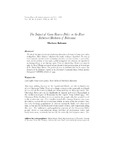| dc.contributor.author | Bolaane, M. | |
| dc.date.accessioned | 2008-10-09T09:31:46Z | |
| dc.date.available | 2008-10-09T09:31:46Z | |
| dc.date.issued | 2004-08 | |
| dc.identifier.citation | Bolaane, M. (2004) Social Policy and Administration, Vol. 38, No. 4, August, pp. 319-417 | en |
| dc.identifier.issn | 0144-5596 | |
| dc.identifier.uri | http://hdl.handle.net/10311/229 | |
| dc.description.abstract | The aim of this paper is to present a background discussion on the impact of game reserve policy
on Bugakhwe, " River BaSarwa" (Bushmen/San people) in Eastern Ngamiland. The issues of
local community ownership and its relationship to perceptions of what constitutes a rural development,
and the problems of land rights, wildlife management and settlement, are important in
the booming industry of the Okavango region. When the Moremi Game Reserve was created in
1963, the San of Khwaai were moved out and relocated in their present position, at the north gate
of the Moremi Game Reserve. The question of access to traditional land and its resources has
characterized the BaSarwa's response to the government's Community Based Natural Resource
Management (CBNRM) initiative of 1995. | en |
| dc.language.iso | en | en |
| dc.publisher | Blackwell Synergy; The definitive version is available at www.blackwell-synergy.com | en |
| dc.subject | Land rights | en |
| dc.subject | Game reserve policy | en |
| dc.subject | River BaSarwa/Bushmen | en |
| dc.subject | Botswana | en |
| dc.title | The Impact of Game Reserve Policy on the River BaSarwa/Bushmen of Botswana | en |
| dc.type | Article | en |

